Forum Replies Created
-
AuthorReplies
-
Hi all, I’m a newbie to both the forum and CasP. Although I only stumbled across the CasP literature a couple of days ago (and have therefore only read a tiny fraction of it), I find the core arguments intriguing and persuasive. So much so that I am seriously considering using CasP as my main theoretical approach- even at this VERY late stage in my PhD research (I am currently in the early stages of writing up my findings!).
Welcome to the site. Always nice to see new people show curiosity about CasP research.
I could talk about my empirical research experiences for days. I also do think your thinking about the back-and-forth relationship between abstract theory and empirical data is meaningful.
To keep my thoughts focused I’ll try to give some practical advice to your questions:
(a) Do you think it would be feasible to undertake this sort of analysis within say the next 2-3 months?
Like Blair said, it depends. One way it depends is from the way this empirical work will integrate with your project. Let’s take a worse case scenario, where you find a bunch of interesting things and they contradict a lot of your working theories. When we work in pure theory, this scenario can’t occur because nobody intentionally makes a broken theoretical model. Additionally, my long experience with political theory is that academia eschews theoretical vacuums. We are often pressured to have a theory explain everything, or as much as possible. With what Marxism has become in the last 150 years, this pressure is high.
The empirical work can be a release valve, whereby you use the empirical work test hypotheses. These results can be unexpected or even hard to understand, but the trick is to adopt a different temperament to new research. Publication of negative or partially-negative results are everywhere in the sciences, but almost nowhere in the social sciences. Thus, could the empirical work be a way for you to gauge your confidence in what you are claiming? Are there arguments that require qualification? Is there evidence that existing theories of your project don’t easily overlap the facts?
(b) If you think (a) is feasible, it would be great to get some pointers on where I might find the relevant data and how best to go about analysing it?
If there is specific data that needs to be downloaded, you can always inquire on this forum. Some of us have access to financial databases (also check your university subscriptions) and some data gathering would take less than an hour of anyone’s time. Also don’t be shy about the smallest or simplest of questions. When I first started, I was amazed to learn how to create moving averages in Excel–this was taught to me in Jonathan’s course.
Have specific questions you want to answer. This is very important if your time is limited. Free-form quantitative research is very fun–you can gather and play with data–but it eats up a lot of time and often it does not reveal anything straight forward. Before I worked on my research on Hollywood cinema I tried to get some data on coffee bean prices from around the world. I found some but I had no theory or hypothesis I wanted to test. Therefore, I was sitting at home making time series (moving averages, rates of change) that looked like they said something (lines went up, lines went down), but I didn’t even know why I needed data on coffee bean prices in the first place.
Agree 100%. I will be able to get that done later in the week (labels + notes).
Using GFD and Bank of England data shows a very similar situation in Great Britain:
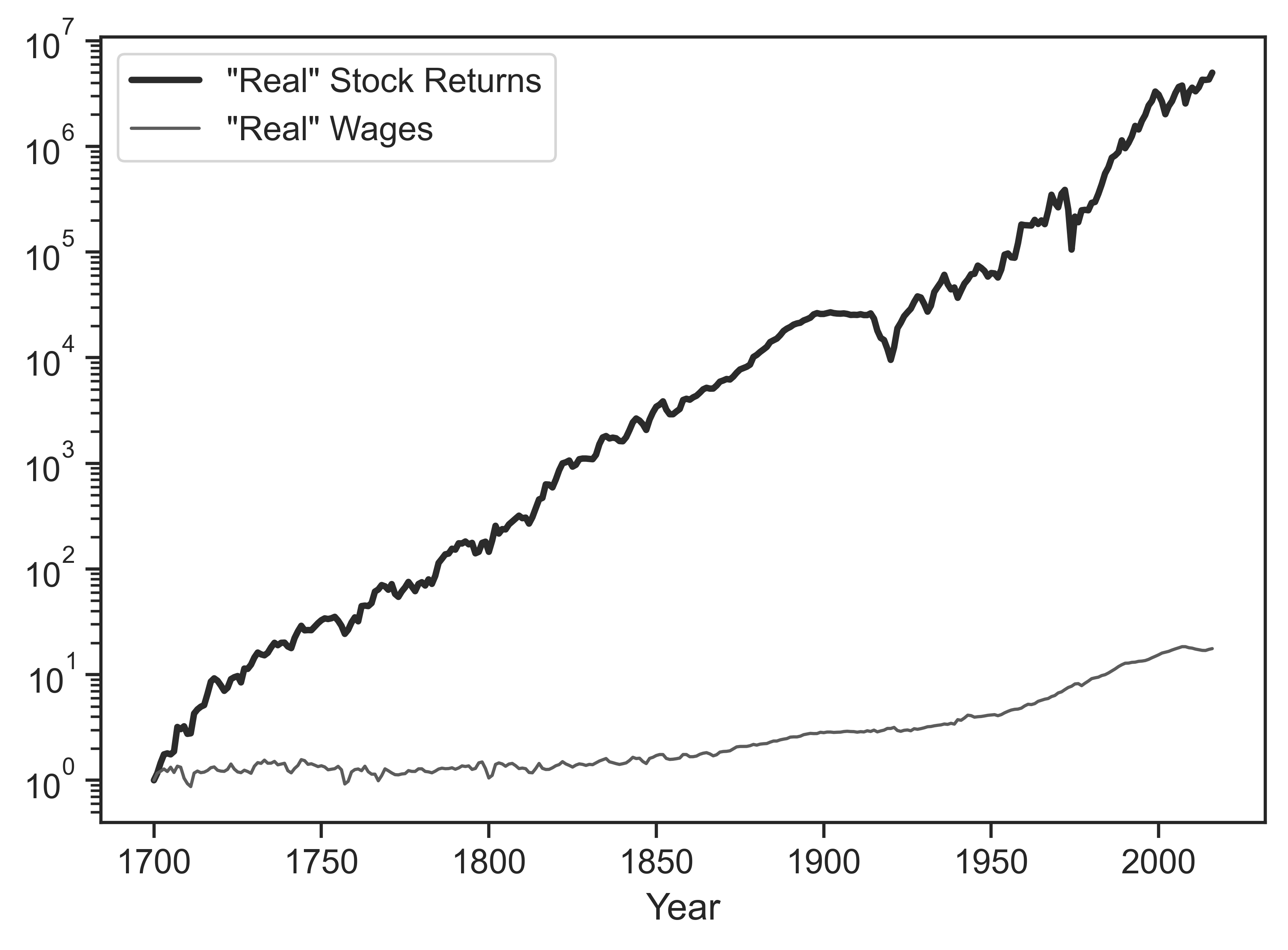
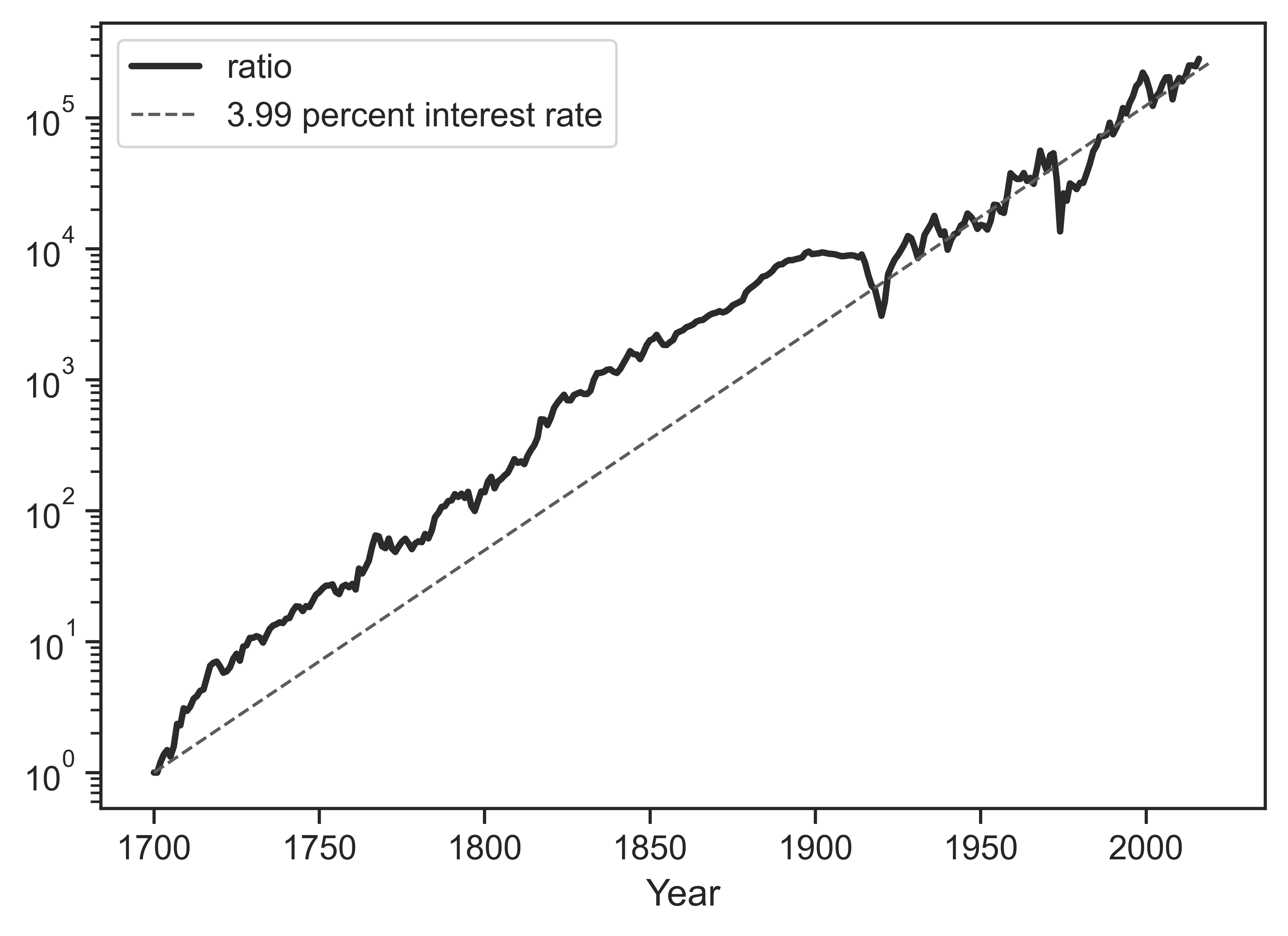
- This reply was modified 4 years, 6 months ago by jmc.
November 28, 2020 at 12:01 pm in reply to: Can Capitalists Continue to Squeeze the Income Share of Employees? #4561Very interesting breakdown of the labour share of income. A quick reaction: I wonder if this figure can help show the degrees of sabotage in employment. At the most brutal end of the spectrum you have the decreasing compensation and decreasing employment. But that can be very socially destabilizing. The more strategic approach is keep employment per capita strong, but to make the meaning of employment worse (part-time, contract, fewer raises of income).
Jonathan, I agree with the CasP interpretation of what the stock market represents. I think the motivation behind my post was to think about the reasons for a politician to openly celebrate a stock market increase. There are ideological dimensions–some held by the politician and some held by the public.
From the politician side: Is an elected politician–Trump or otherwise–transparently celebrating the capitalist mode of power? Or are some mistakenly assuming that a stock market increase is a good barometer of economic well-being? Does it matter what they believe?
From the public side: Does the figure you present have argumentative force on its own? Or is it likely that without a deeper re-think of what capital is, the public will misunderstand or skew the meaning of the figure you present? If I had to guess, the general audience can dislike Trump talking about the stock market, but they are also not re-conceptualizing why someone would refer to stock market gains.
November 22, 2020 at 11:34 am in reply to: Intellectual property and the capitalist share of income #4538Something like that, Max? You essentially want it as a post in the thread, and not simply a reply to Jonathan’s post.
The analysis I’m doing is trying to identify where the revenue that flows through a corporation ends up. I’m not focused on what is happening with the recipients. Part of the revenue is used to buyback shares and that money flows to the asset owners, while the company gains back a portion of its outstanding shares.
I’m admittedly a novice on the accounting practices of national accounting. But I am curious why the “Owners v. Corporations” chart has rental income on the owners side, when it can technically include landlords who do not have rental income travel through a corporation. If rental income is counted on the assumption that corporations rent some of their properties to others, this is how the BEA explains the definition:
Rental income of persons is the net income of persons from the rental of property. It consists of the net income from the rental of tenant-occupied housing by persons, the imputed net income from the housing services of owner-occupied housing, and the royalty income of persons from patents, copyrights, and rights to natural resources. It does not include the net income from rental of tenant-occupied housing by corporations (which is included in corporate profits) or by partnerships and sole proprietors (which is included in proprietors’ income). Like other measures of income in the national income and product accounts (NIPAs), rental income of persons measures income from current production and excludes capital gains or losses resulting from changes in the prices of existing assets.
If the intention is to naively look at the flow of profits (before economics defines what is rent or not), your case can be made with undistributed v. dividends. In the United States, at least, the ratio of dividends/undistributed profits has tended to increase since the 1980s.
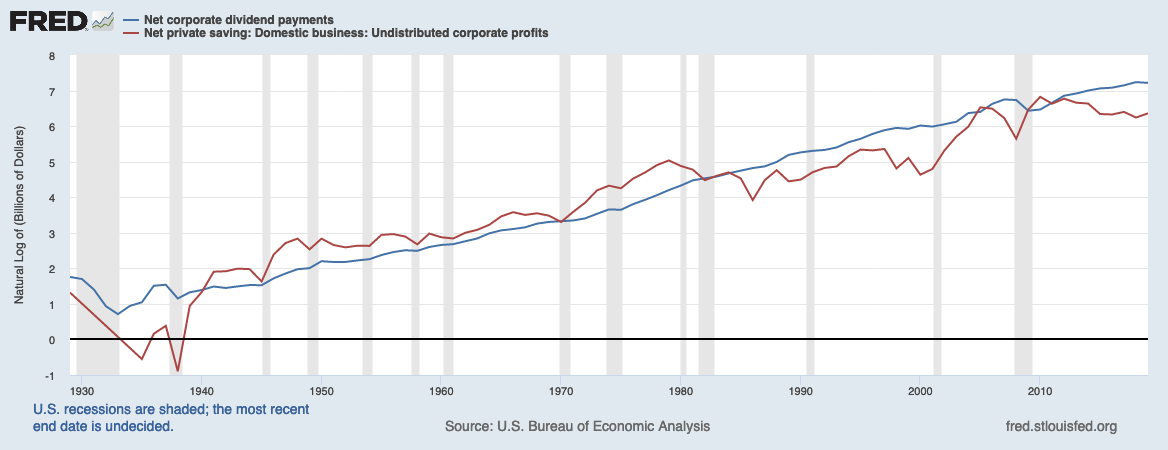
Great read! I particularly liked the step-by-step reveal of what cannot be said in neo-classical language. Like Blair’s experience, I was made to think a lot about the significance of the prefix “anti-“. The removal of it is such a simple way to make oppositions in ideology look harmless and to model a world where individual reason is free to calculate gains in utility.
Also, when I think of neo-classical word choice, I think of Gang of Four, who used it for a song title:
Thanks for the info, Blair. Past winners have produced top-notch work!
A time-consuming aspect of web scrapping is figuring out how you will capture the pages you want. In the case of World Prison Brief, there is a side bar that is allowing the user to go from country to country, or region by region.

Code can be written to find all of the pages in the html.
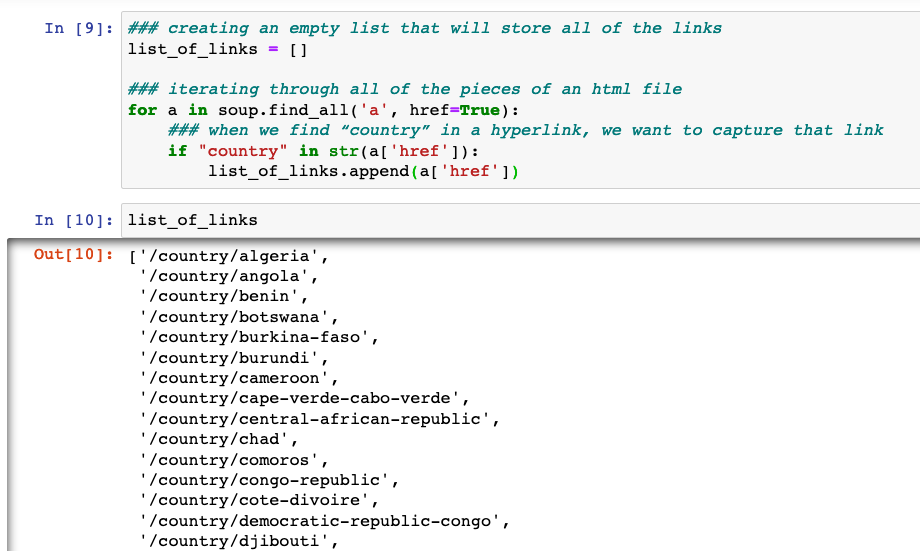
Knowing a bit about data frames is useful because when you pass an html page through pandas you are only a few steps from a data frame. Essentially, pandas is already looking for the tables in a website. BeautifulSoup is better when you want to be able to look for anything.
A website like WPB will not give you a clean scrape. Rather your html tables come out as an ugly. But, let me show a comparison of how far you can get with a few lines of code. The country in the example is Tanzania.
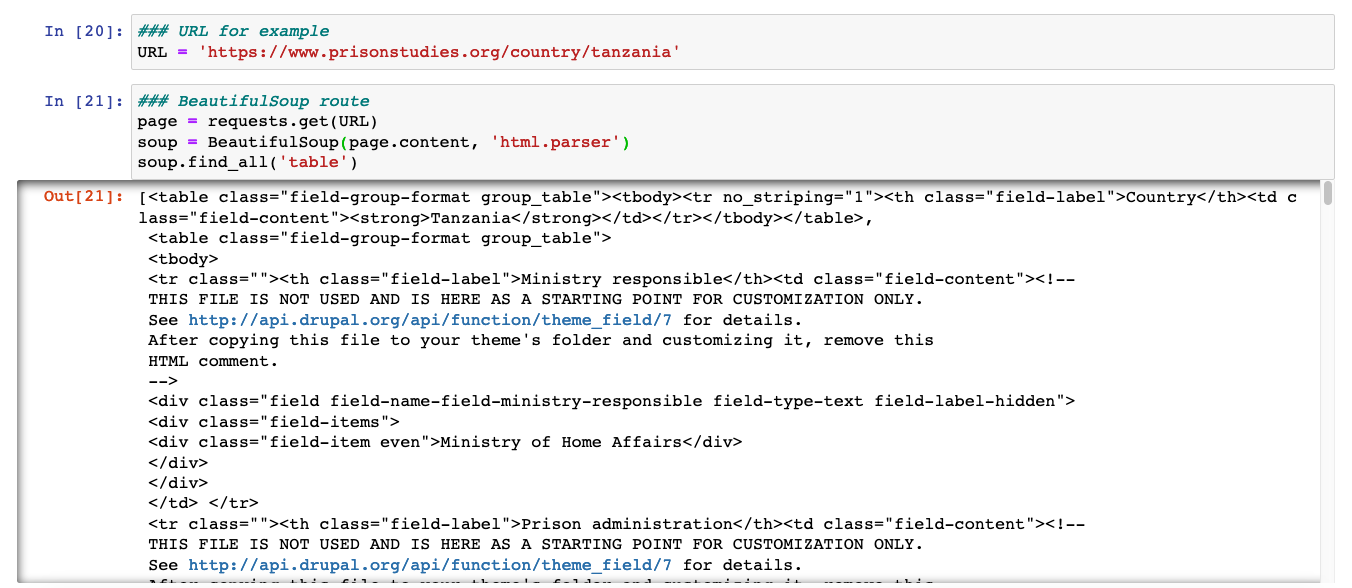
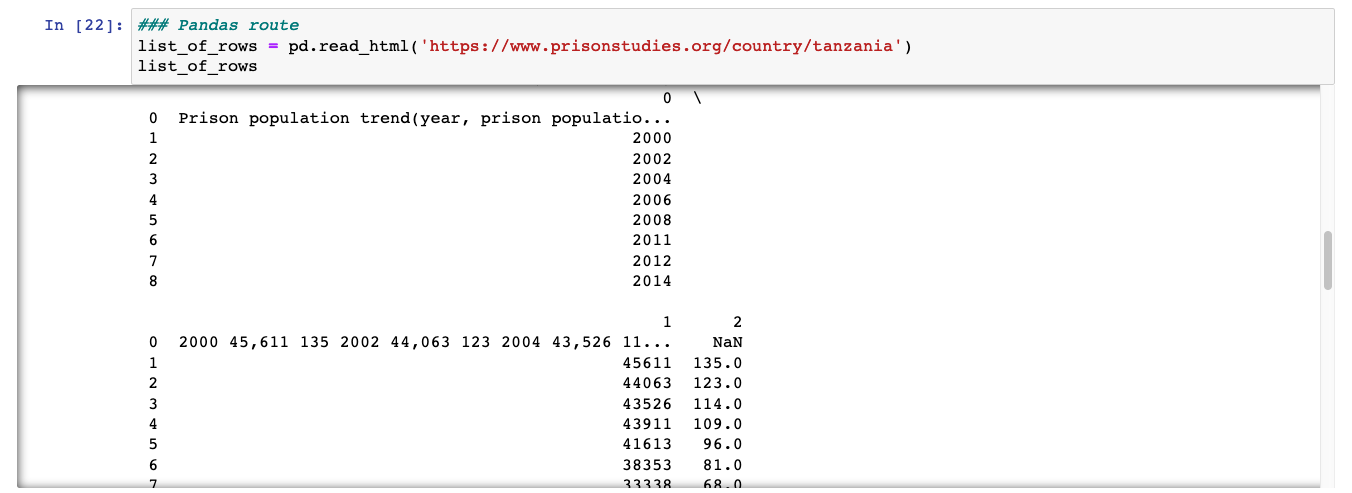
We do not have a nice data frame yet, but you can see that, for our purposes, pandas is taking a short path to getting the data points within a table.
Intriguing, James. Can you elaborate on the code you are using and explain a bit more on what the chart shows?
I’ll post in steps.
The code was not too difficult, but it is likely that the scraped website determines the complexity. I also believe that you have to be willing to find a pattern to iterate across different pages. For example, simple code will break if it says to look for 1998 data and one page does not have it.
I was working in Python. A Python typical library for web scraping is BeautifulSoup. I am finding that pandas is easier, as my goal is to have to have a data frame of prison data.
For those who are unfamiliar with data frames, they are popular data structures in R, python and other coding languages. Very long story short: they function a lot like Excel data, where you can edit cells but you can also apply functions across rows and columns. Here is me loading into a data frame a csv that is close to what I attached above:
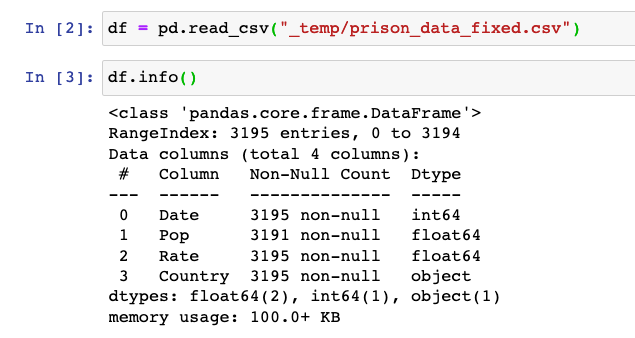
Depending on the software you are using, you can look at the data frame just like an Excel sheet. My preference is to make quick checks that everything is OK. Here is me wanting to see the first 10 rows of the data frame:
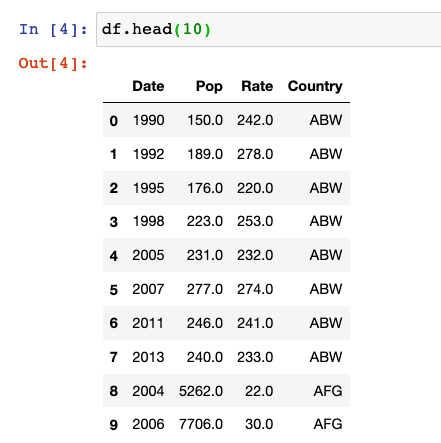
-
AuthorReplies
